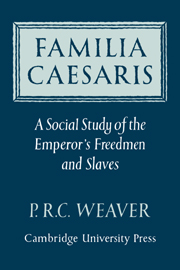Book contents
- Frontmatter
- Contents
- Preface
- Abbreviations
- INTRODUCTION
- PART I NOMENCLATURE AND CHRONOLOGY
- PART II THE FAMILY CIRCLE
- PART III THE EMPEROR'S SERVICE
- 12 Vicarii
- 13 Liberti servus and liberti libertus
- 14 ‘Vicariani’
- 15 The occupational hierarchy: some points of method
- 16 Sub-clerical grades
- 17 Adiutores: junior clerical grades
- 18 Intermediate clerical grades
- 19 Senior clerical grades
- 20 Senior administrative grades: a rationibus, ab epistulis, etc.
- 21 Freedman procurators
- 22 Imperial freedmen and equestrian status: the father of Claudius Etruscus
- CONCLUSION
- APPENDIXES
- Bibliography
- Index
21 - Freedman procurators
Published online by Cambridge University Press: 07 October 2011
- Frontmatter
- Contents
- Preface
- Abbreviations
- INTRODUCTION
- PART I NOMENCLATURE AND CHRONOLOGY
- PART II THE FAMILY CIRCLE
- PART III THE EMPEROR'S SERVICE
- 12 Vicarii
- 13 Liberti servus and liberti libertus
- 14 ‘Vicariani’
- 15 The occupational hierarchy: some points of method
- 16 Sub-clerical grades
- 17 Adiutores: junior clerical grades
- 18 Intermediate clerical grades
- 19 Senior clerical grades
- 20 Senior administrative grades: a rationibus, ab epistulis, etc.
- 21 Freedman procurators
- 22 Imperial freedmen and equestrian status: the father of Claudius Etruscus
- CONCLUSION
- APPENDIXES
- Bibliography
- Index
Summary
The senior administrative career of the Imperial freedmen has a second and perhaps more important aspect, that of the freedman procurators. They are much more numerous, less notorious, but longer lasting than their Palatine counterparts. Their numbers and responsibilities increase rather than decrease with the expansion of the bureaucracy in the second century, although they fill the same roles as the Palatine heads, both as sole heads of departments and also as auxiliary heads in conjunction with a superior colleague of equestrian rank. The freedman procurators are found not only in the administration of the emperor's estates, villas and other property in Italy and elsewhere throughout the empire, but also in the smaller departments in Rome as well as in all the main administrative centres in the provinces. The number of senior posts in the Palatine bureaux was relatively few and their holders were somewhat exceptional. The procuratorial posts on the other hand, whether carrying the responsibilities of sole or auxiliary head of a department, or whether exercised in a minor Imperial villa or a major province, make up the normal senior freedman career. The range of these freedman posts and the extent to which they were formally organised into a system of grades on the model of the equestrian procuratorships must now be considered.
‘Procurator’ in the late Republic was a term of private law meaning a personal agent or manager of another's affairs and under the Empire it continued to be used in this sense. For private citizens such procurators were usually their freedmen.
- Type
- Chapter
- Information
- Familia CaesarisA Social Study of the Emperor's Freedmen and Slaves, pp. 267 - 281Publisher: Cambridge University PressPrint publication year: 1972



